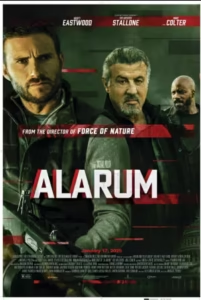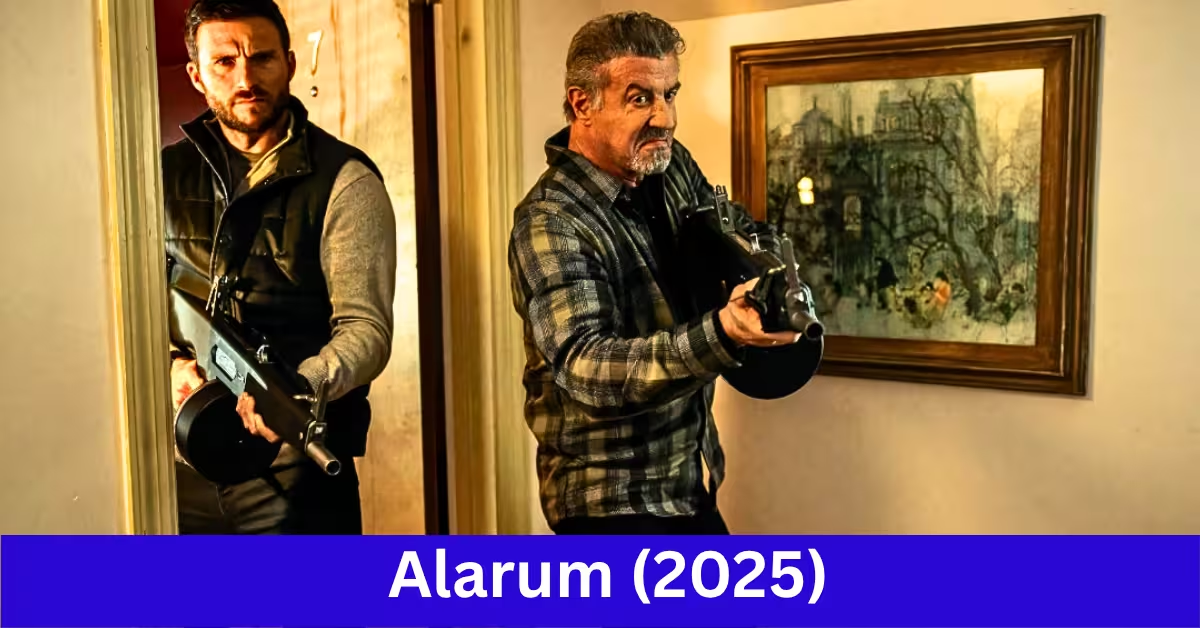Alarum (2025), directed by Michael Polish and starring Scott Eastwood, Sylvester Stallone, and Willa Fitzgerald, is one such cinematic enigma. Set against the shadowy backdrop of espionage and emotional entanglement, this action crime thriller dares to ask whether love can survive in a world built on deception.
Have you ever wondered what happens when love infiltrates a world built on secrets and betrayal? Alarum (2025) attempts to answer that—and in doing so, it asks more than it resolves.

Directed by Michael Polish, Alarum is an American action crime thriller that leans heavily on its star power—Scott Eastwood, Sylvester Stallone, and Willa Fitzgerald among them. Released on January 17, 2025, by Lionsgate, the film offers a compact runtime of 95 minutes, but its emotional and thematic reach attempts to go far beyond that window.
On first viewing, Alarum seemed to promise a high-octane ride rooted in espionage, romance, and the disillusionment of idealism. What I didn’t expect was the profound clash between its lofty themes and its jarring execution—a cinematic contradiction that I find both fascinating and frustrating.
Despite scathing early reviews, including a 0% rating on Rotten Tomatoes from 20 critics and a damning 23/100 on Metacritic, I was compelled to see if the heart of Alarum beat stronger than its statistics suggested. Sometimes, art isn’t about flawless craft—it’s about flawed expression. And that’s where I believe this film makes its mark: not in perfection, but in imperfection.
Plot Summary
Rivals in the Shadows
Set in a world of international espionage, Alarum introduces us to Agent Joe Travers (Scott Eastwood) and Agent Lara Travers (Willa Fitzgerald)—two operatives from rival agencies. Their relationship begins, predictably, with animosity and mutual distrust. But during a high-risk joint mission, professional boundaries blur, and emotional walls start to crack.
Their romance, though against protocol and perilous, forms the foundation of the film’s core emotional conflict. Love, once forbidden, becomes their salvation—and their undoing.
Love on the Run
The lovers do the unthinkable: they abandon their missions, defect from their respective agencies, and vanish into obscurity. They find peace in a secluded cabin surrounded by forest—a serene illusion of safety. It’s a quiet rebellion against a life built on lies, surveillance, and violence.
But as with all stories of peace, this interlude is short-lived. When a plane crashes near their haven and a hard drive containing sensitive information is recovered, Joe and Lara are pulled back into a world they barely escaped.
This moment—utterly cinematic in its abruptness—signals the turning point. Multiple organizations, each with murky motives, are now after the data… and Joe and Lara.
Enemies Within
Sylvester Stallone appears as Agent Chester, an aging intelligence veteran tasked with recovering the data. He represents the old guard—loyal to a cause that no longer serves the people, only power. His performance adds a layer of weathered authority, giving gravitas to a narrative that occasionally teeters on melodrama.
Mike Colter’s character, Orlin, a ruthless mercenary, injects unpredictability into the storyline. He doesn’t play by agency rules. He plays for the highest bidder.
Bridgette (Ísis Valverde), a cyber-expert with her own buried loyalties, and Director Burbridge (D.W. Moffett), the bureaucratic puppet master, further entangle the narrative with subplots of betrayal, double-crosses, and strategic manipulation.
Trust and Turmoil
As the couple fights to survive, the question looms: Can love exist in a world that profits from deception? Their bond is tested—not just by enemies with guns, but by doubts, old alliances, and harsh truths.

The real enemy, the film suggests, isn’t an assassin or a drone—it’s the system they once believed in. As secrets unravel and identities blur, even viewers begin to question who the real protagonists are.
The Final Alarm
Without spoiling the ending, Alarum concludes in the way many thrillers do—with a mix of closure and uncertainty. But what lingers isn’t the final scene—it’s the tension between love and loyalty, mission and meaning.
Analysis
1. Direction and Cinematography
Michael Polish, best known for intimate dramas like Northfork and Twin Falls Idaho, enters unfamiliar terrain with Alarum. It’s clear from the first frame that he intends to inject a sense of arthouse gravity into a genre that typically favors adrenaline over introspection.
But here’s the catch: Polish’s signature poetic restraint doesn’t always align with the demands of an action thriller. The camera lingers in places it should cut, and cuts in moments that deserve more time to breathe. The result is a narrative rhythm that can feel both jarring and mesmerizing.
Cinematographer Jayson Crothers (Chicago Fire, Runaways) deserves commendation for attempting to bridge that gap. Wide aerial shots of Hueston Woods, Ohio—where the film was shot—contrast beautifully with close, claustrophobic interiors that reflect the characters’ inner turmoil. The muted color palette—steel blues and military grays—speaks volumes about a world drained of innocence.
Still, the cinematography sometimes seems to battle the screenplay, not elevate it. It’s like watching two very talented artists paint over each other’s canvases.
2. Acting Performances
Scott Eastwood’s portrayal of Agent Joe Travers is his most emotionally engaged role to date. For once, he doesn’t just brood—he aches. There’s a raw vulnerability in his scenes with Lara (Willa Fitzgerald) that feels genuine. You can sense the weight of past betrayals in his eyes, even when the dialogue fails to articulate it.
Willa Fitzgerald’s Lara is the true revelation. Her performance oscillates between tactical sharpness and soft vulnerability with grace. She’s not just the love interest—she’s a co-conspirator in both love and crime. The chemistry between Fitzgerald and Eastwood is palpable and lends believability to the film’s central romance.
Then there’s Sylvester Stallone. At 78, he’s clearly enjoying his twilight roles where authority and weariness intersect. As Agent Chester, he’s less the hero, more the weary executioner. While his screen time is limited, it’s impactful—especially in a monologue where he reflects on the futility of sacrifice in a system that forgets its soldiers. It’s vintage Stallone, weathered and wise.
Mike Colter’s Orlin is perhaps the film’s most underutilized asset. There’s menace in his stillness, charisma in his cruelty, but the script gives him little room to grow. The same can be said for D.W. Moffett as Director Burbridge, who feels like a cardboard cutout of a bureaucratic villain. He delivers, but with nothing to truly sink his teeth into.
3. Script and Dialogue
Written by Alexander Vesha, the screenplay of Alarum is filled with ambitious themes: betrayal, surveillance, freedom versus duty. And yet, its greatest weakness lies in its dialogue. Characters often speak in monologues that sound more like philosophical essays than real conversations.
In one scene, Joe says, “What’s the difference between loyalty and a leash?” It’s a powerful line—until it’s followed by five more like it in the same breath. The film doesn’t trust its viewers to reflect. It tells them what to think, again and again.
Still, the narrative structure has its merits. The central conflict is well-conceived: love colliding with duty. But the pacing falters. The second act drags, bogged down by exposition that could’ve been better visualized. Had the script shown more and told less, Alarum might have been far more riveting.
4. Music and Sound Design
Yagmur Kaplan’s score attempts to carry much of the emotional weight left unattended by the dialogue. At times, it succeeds. The quiet piano motif that accompanies Joe and Lara’s cabin scenes is hauntingly beautiful—evocative of James Newton Howard’s work in The Village.
Where the film falters visually, the soundscape picks up the slack. The plane crash sequence, for example, is terrifying not for what you see—but for what you hear. Shattering metal, screeching air, and sudden silence. That sequence alone proves Kaplan understands how to manipulate tension through sound.
However, some action scenes suffer from overly aggressive sound mixing, drowning out key lines of dialogue. And in a thriller where information is everything, that’s a serious misstep.
5. Themes and Messages
At its core, Alarum is about disillusionment. It’s about operatives who believed in the righteousness of their missions, only to realize they were pawns in a larger, morally bankrupt game.
One of the most poignant themes is romantic escape from institutional entrapment. Joe and Lara’s relationship is more than a subplot—it’s a rebellion. In an age where loyalty is transactional and privacy is a relic, their love becomes the most radical act of all.
There’s also a socio-political undercurrent here. The film subtly critiques the surveillance state, the commodification of secrets, and the military-industrial complex. It asks: When everyone’s watching, is freedom even possible?
And yet, for all its thematic ambition, Alarum sometimes overreaches. Its attempts at depth can feel preachy. Still, I’d rather a film aim high and stumble than play it safe and vanish without a trace.
Comparison with Similar Films
At first glance, Alarum attempts to follow in the footsteps of genre staples like Mr. & Mrs. Smith and The Bourne Identity, blending high-stakes action with a central romance and themes of betrayal. Yet what makes those films timeless isn’t just the explosive set pieces or the chemistry between leads—it’s clarity of tone and confident execution.
Compared to Mr. & Mrs. Smith, which perfectly balances its comedic tone with sleek action, Alarum feels much heavier—both emotionally and narratively. It trades wit for wistfulness, charm for contemplation. But that trade-off doesn’t always work. What made Mr. & Mrs. Smith tick was how much fun it was to watch, even when it ventured into emotional territory. Alarum takes itself very seriously, and at times that sincerity feels burdensome.
Meanwhile, if we look at The Bourne Identity, a film that similarly revolves around a rogue operative uncovering secrets about his past, we find a masterclass in pacing and tension. Alarum tries to create that same slow burn, but it doesn’t maintain the suspense. It’s not that the stakes are too small—it’s that they’re too murky.
Where Alarum does manage to carve out its own space is in its romantic rebellion against espionage. Films like Allied (2016) touch on this idea, but Alarum makes the love story central. It’s not a subplot. It’s the mission itself. That unique emotional core gives the film heart, even when the storytelling stumbles.
Audience Appeal & Reception
Let’s be brutally honest here: Alarum has not been well received.
On Rotten Tomatoes, the film has a rare 0% approval rating based on 20 reviews, with an average score of 3.5/10. That’s a cinematic scarlet letter, one usually reserved for the truly disastrous. Meanwhile, Metacritic lists the film with a score of 23/100, signaling “generally unfavorable reviews” from critics.
RogerEbert.com gave it one star out of four, calling it “forgettable” and “conceptually muddled.” Collider’s Jeff Ewing labeled it “an idea without a plan,” giving it a mere 3/10.
But numbers don’t tell the whole story. Audience responses have been more nuanced. While some viewers echo the critics’ frustration—pointing to weak dialogue and clunky pacing—others have praised the emotional performances and ambitious themes. On niche forums and Reddit threads, a curious cult interest is forming around the film’s anti-Hollywood approach to storytelling.
So, who is Alarum really for?
This isn’t a casual Friday night popcorn flick. It’s not for those seeking explosive sequences every five minutes. Instead, Alarum appeals to cinephiles—viewers who appreciate flawed but thoughtful films that dare to go against genre expectations. It’s also for romantics who crave emotional intimacy in their thrillers, not just chase scenes.
If you’re willing to sit with imperfection and reflect on what a film means rather than what it delivers, you might just find Alarum worth the watch.
Personal Insight: Lessons and Relevance in 2025
Watching Alarum in 2025 hits differently than it would have even a few years ago. We’re living in a time when public trust in institutions—government, intelligence, even media—is increasingly frayed. The idea that agents would walk away from duty not because they’re disloyal, but because they realize their loyalty has been abused, resonates powerfully in today’s socio-political climate.
Joe and Lara aren’t just lovers—they’re whistleblowers of the heart. Their desertion isn’t cowardice; it’s a declaration that emotional truth matters more than patriotic lies. And isn’t that what many of us are wrestling with in our own way? Choosing our mental health over toxic workplaces. Our families over capitalist hustle culture. Our values over outdated expectations.
The movie asks, “What would you sacrifice to live authentically?” And while it fumbles the answer at times, the question lingers like a haunting refrain.
In a way, Alarum is not a failed thriller. It’s a broken poem. It’s a love letter wrapped in a bullet casing. Messy, clunky, but sincere.
Quotations
Here are a few lines from Alarum that stuck with me:
- “What’s the difference between loyalty and a leash?” — Joe Travers
- “They trained us to survive everything—except peace.” — Lara Travers
- “A hard drive doesn’t kill people. Secrets do.” — Agent Chester
- “When the mission ends, who are we?” — Bridgette
These quotes, while not always gracefully delivered, reflect the soul of the movie. They show what the film is trying—sometimes desperately—to communicate.
Pros and Cons
✅ Pros:
- Emotionally driven performances (especially from Fitzgerald)
- Stunning use of natural landscapes
- Thought-provoking themes on loyalty and love
- Subtle critique of surveillance and power
- Ambitious genre blending
❌ Cons:
- Poorly received by critics
- Overwritten, often preachy dialogue
- Uneven pacing throughout
- Underdeveloped supporting characters
- Lacks the polish expected in high-budget thrillers
Conclusion
Alarum is not a flawless film. It is, however, a human one.
In an era dominated by algorithmically perfected blockbusters and studio-safe narratives, Alarum dares to stumble toward meaning. It wrestles with themes larger than itself—love versus duty, truth versus loyalty, freedom versus fate—and it does so with a strange sincerity that lingers long after the credits roll.
Yes, the dialogue often falters. Yes, its pacing wobbles like a spy out of breath. But underneath those cracks lies a beating heart that many modern thrillers lack. Alarum tries. It reaches. It fails beautifully. And for that, I can’t help but admire it.
Would I recommend Alarum to everyone? No. It’s not a crowd-pleaser, and it certainly won’t convert skeptics of the genre. But for viewers who long for an emotionally anchored thriller—one that values intimacy over explosions, reflection over resolution—Alarum is worth your time.
Final Verdict: Rating
⭐️⭐️⭐️ out of 5
“Alarum” is a beautifully broken espionage tale: more heart than heat, more message than momentum.
Movies like Alarum remind us why we watch films in the first place—not just to be entertained, but to feel something real. Even when that feeling is conflict. Even when the execution doesn’t match the ambition.
To some, Alarum may be a failed thriller. But to me, it’s a love story in disguise—a whisper beneath the gunfire. And in today’s world, maybe that’s exactly what we need.
